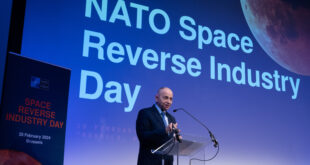
On 6 April 2020, the White House issued an Executive Order on Encouraging International Support for the Recovery and Use of Space Resources (EO), the latest in a series of directives that the White House has issued to set American space policy over the last three years.[1] This one focuses on building international support for space resource recovery, or, as everyone else calls it, space mining. Looking at the title of the EO, one might think that it is intended to build partnerships and support among the international community for an exciting new space venture. However, upon reading its provisions, it emerges that this Order is a unilateral effort to set the global agenda on discussing space mining. Moreover, it raises considerable doubt about the concept of “global commons,” something which the US Government has recognized and built policy on for years. In an effort to create certainty around the question of space mining, the White House will stir up further skepticism among other UN Member States regarding their intentions behind space mining, many of which will become more prominent space actors in the near future.
The Controversy Around Space Mining
In 2015, the US passed the Commercial Space Launch Competitiveness Act, an ambitious bill that, among other things, recognized the right of US citizens to collect and extract resources from celestial bodies, like the Moon.[2] The SPACE Act was not without controversy, with some arguing that this law was an attempt by the US to create property rights in lunar resources, which is seen by some as prohibited under the Outer Space Treaty.[3] While this unilateral move was greeted with some consternation, Luxembourg soon followed with its own bill in 2017, and the UAE in December of 2019. [4] Slowly, sentiments have been warming to the idea of space mining around the world.
At the international level, the new national laws on space mining generated considerable debate at the UN Committee on the Peaceful Uses of Outer Space (COPUOS). Not all States agreed that space mining was consistent with international law, especially Article II of the Outer Space Treaty, which prohibits claims of sovereignty in space.[5] Some States even referred to the Moon Agreement, the ugly duckling of the UN treaties on outer space that only has 18 ratifications (none of which are considered to be major space powers) and has not yet come into force.[6] They argued that the new national laws are a reversal of the spirit under which the Moon Agreement was negotiated, including by the US. However, the US has consistently objected to the Moon Agreement and the principles contained therein. The latest executive order from the White House has reminded everyone of that fact.
A Battle that Need Not be Fought
The EO sets out to accomplish three major tasks:
- Eliminate legal uncertainty around legitimacy of space mining activities that are generated by the Moon Agreement or any other international legal mechanism;
- Reiterate that the Moon Agreement is not legally binding and is not part of customary international law; and
- Encourage international support for safe and sustainable space mining activities.
These aims and objectives are all in line with traditional US positions, but it is the manner and timing of the EO that suggests a lack awareness of the international context.
While there are many States that initially expressed criticism over unilateral steps to begin space mining operations, they are not outright opposed to the possibility of lunar resource exploitation. Indeed, at last year’s meeting of the Legal Subcommittee of COPUOS, there was considerable discussion around the formation of a working group to examine international regulation and authorization of space mining. This shows considerable progress from years past when States were opposed to the idea altogether.[7] Nevertheless, the US opposed the formation of a working group at that time as it did not think the matter was mature enough for discussing regulation.[8] If the aim of the US is to legitimize space mining at the international level, though, the latest Executive Order will only make reluctant States dig their heels in even further. This will make discussions over space mining go on even longer before any decision is made, which would also seem to be contrary to what the White House wants, which is the legitimization of space mining.
The Executive Order also does not go particularly far in eroding the legitimacy of the Moon Agreement. In the aftermath of the order’s release commentators noted it as a US repudiation of the Moon Agreement, which is redundant since the US already did this in the early 80s when it declined to ratify the agreement. It is already well established that the US does not consider the Moon Agreement binding, nor is it binding on actors authorized by the United States. Even if many countries were to suddenly ratify the Moon Agreement and bring it into force, it still would not be binding on the US. The legal ambiguity created by any recent mentions of possibly re-energizing the Moon Agreement are, therefore, minimal.
The US gripe here seems to not be with the Moon Agreement itself, but with any international regime that might regulate space mining. The US has long maintained a policy that no new international rules need to be adopted for space. This is in part due to contemporary skepticism of international law in US politics, but in the context of space resources it is also underpinned by a US conceit that it will be first to the resources. Whilst it is natural to have concern over the structure of an international regime on space mining, the US would likely have considerable influence in the manner it is shaped. For example, it could be based on something like the International Telecommunications Union (ITU), which coordinates (but does not authorize) the orbit spectrum resource in the geosynchronous orbit. Such a mechanism would favour the US because it would still have complete control over the manner and severity of regulations for US space mining activities. The EO does direct the Secretary of State to negotiate bilateral and multilateral “statements and arrangements” consistent with the policy. This is notable as the chosen wording avoids using the words ‘agreement’, which would indicate an instrument of a binding nature. While the EO seeks to give a semblance of international cooperation, it is in line with the United States’ long-standing position of opposing any new substantive rules in space.
Indeed, in its attempt to create “certainty” the US has thrown investors out of the frying pan and into the fire. The 2015 law and subsequent international response gave investors certainty of the legality of resource extraction, but the lack of an international framework to legitimate claims leaves these investors not knowing if their investment in a particular mission today will still be safe after the research and development of the bespoke systems that will be needed in the early phases of resource extraction.
Global Commons
The EO also states that “Outer space is a legally and physically unique domain of human activity, and the United States does not view it as a global commons.” This phrase is the US being the proverbial bull in the china shop.
The idea of a Global Commons has been attacked in the US with commentators arguing that the idea of space as a global commons undermines commercial operations. This is in part because the idea of a commons in the economic sense has been mixed with the international law concept of global commons, which is simply a typology for an area that is not subject to the sovereign control of any state. The other global commons under international law are the high seas and Antarctica. It should be clear that the classification of a place as a global commons does not inhibit commercial activity without express consent of states. Commercial activities in the high seas are absolutely allowed regardless of the fact that it is a global commons, whereas on Antarctica commercial activity is not allowed, but only because states have agreed to specific provisions banning these types of activities.
What is particularly surprising about the EO is that it undermines a concept that is at the foundation of several US space policies. For example, in 2012, the Department of Defense issued its strategic guidance for the 21st Century, noting:
“To enable economic growth and commerce, America, working in conjunction with allies and partners around the world, will seek to protect freedom of access throughout the global commons — those areas beyond national jurisdiction that constitute the vital connective tissue of the international system. Global security and prosperity are increasingly dependent on the free flow of goods shipped by air or sea. State and non-state actors pose potential threats to access in the global commons, whether through opposition to existing norms or other anti-access approaches.”[9] (emphasis added)
Here, the DoD even acknowledges that it applies the international legal definition of global commons, rather than the economic one. The DoD goes on to express its commitment to access to the global commons:
“The United States will continue to lead global efforts with capable allies and partners to assure access to and use of the global commons, both by strengthening international norms of responsible behavior and by maintaining relevant and interoperable military capabilities.” (text originally in italics)
This view is also shared by NATO, who published their own report regarding assured access to the global commons, including air, sea, cyber and outer space.[10] While these policies may have originated under the previous administration, even those under the Trump White House have acknowledged the utility of the global commons. As recently as October of last year, Vice President Pence sent a strong message to China about the undesirability of limiting access:
“And to make it clear to Beijing that no nation has a right to claim the maritime commons as territorial seas, the United States, in the last year, has increased the tempo and scope of our freedom of navigation operations and strengthened our military presence across the Indo-Pacific.”
It follows that outer space, like the sea, is also open and free for navigation by all. This analogy of comparing the ocean and space is shared at the very least by NASA Administrator Jim Bridenstine (a Trump appointee and strong supporter of the US Commercial Space Launch Competitiveness Act), who gave a recent interview:
“So, we look at other areas where this applies. We look at for example, the ocean. People can extract resources from the ocean, whether you’re fishing or um, extracting energy, you don’t own the ocean, the ocean is international. Um, nobody owns the ocean. But if you apply your effort and your investment to extracting resources, then you can own those resources. And I think that that same model should apply to the moon. When we put that into a bill in the House of Representatives, it got bipartisan support in the house. It got bipartisan support in the Senate, and it was signed into law by President Obama. So, I think, I think that’s a, it it’s a pretty well-established international norm, that I think applies to, to space resources as much as it applies to ocean resources.”[11]
Viewed in this context, the EO is a clumsy bit of diplomacy on the part of the US as it opens an established principle that serves US interests and places that principle in doubt. What will the US fall back on when a rival State claims the lunar water resources as under its sovereign control? What will happen when coastal states begin to challenge US naval superiority by arguing that the high seas are not a global commons? This provision in the EO is short sighted, since the concept of global commons did not stand in the way of commercial activity and its repudiation might very well interfere with future US freedom of access to space. Like much of the current administration’s diplomatic efforts, this provision seems more focused on making headlines from bluster than on advancing US strategy and interests.
The Costs
The EO draws on the mythos that the law is the thing standing in the way of a fully evolved space resources industry. This is demonstrably false. Three states (US, Luxembourg, and UAE) now have domestic legal regimes that allow for space resource activity, and the opposition to these activities in the international community has melted. Two operators, Planetary Resources and Deep Space Industries, were recently pursuing these activities and both failed. They failed not because the law places obstacles in front of them, but because space is expensive and space is hard. The law should facilitate these activities, but the US’ “burn it down” attitude is likely to result in obstacles to international partnerships and damage to its own commercial industry.
While the EO seeks to strengthen the US position in the area of space mining, it will likely come at a political cost in other areas. The US is undoubtedly the current leader in space activities, but they are not the only ones. Space technology is becoming increasingly ubiquitous, granting new actors access to space. A surge in launch services, for example, will see a drop in the price of launching objects, enabling ever more actors to put their own satellites in space. Indeed, Roscosmos just announced it will be lowering its prices by 30% in order to better compete in today’s market.[12] With so much new traffic arriving in orbit, it behooves the established space powers to ensure that the new actors behave responsibly and in a manner consistent with safety and sustainability. Many in the commercial space sector are calling for “rules of the road” in order to strengthen certainty and predictability in space.
What kind of message does this EO send to new actors? What does it say about the importance of cooperation and coordination in a limited environment? As the EO clearly sets out, the US does not see space as a global commons. So what is to stop new space actors from simply looking out for their own interests, regardless of whatever the international governance framework says? In the domain of space activities, it is the US that has the most to lose. It would be unwise to jeopardize much-needed international support on important immediate issues like space traffic management for a long-term victory over space mining, a battle that might never even take place.
With pyrrhic victories such as this, the US will be playing by its own rules, and so will everyone else. In the end, everyone will lose, but perhaps no one more so than the US.
Notes:
[1] It should be noted that this Executive Order does not appear to be in the Space Policy Directive series established by the Trump administration. It is unclear why the EO was not designated as SPD-5.
[2] H.R.2262 – U.S. Commercial Space Launch Competitiveness Act, https://www.congress.gov/bill/114th-congress/house-bill/2262/text
[3] James Rathz, “Law Provides New Regulatory Framework for Space Commerce”, The Regulatory Review, 31 December 2015. https://www.theregreview.org/2015/12/31/rathz-space-commerce-regulation/
[4] “Loi du 20 juillet 2017 sur l’exploration et l’utilisation des ressources de l’espace.” English translation available at: https://space-agency.public.lu/en/agency/legal-framework/law_space_resources_english_translation.html. See also UAE Federal Law on the Regulation of the Space Sector, December 2019, available at https://www.space.gov.ae/Page/20122/20171/Federal-Law-on-Regulating-The-Space-Sector-.
[5] A/AC.105/1113 Report of the Legal Subcommittee on its fifty-fifth session, held in Vienna from 4 to 15 April 2016, par. 74-83. https://www.unoosa.org/oosa/oosadoc/data/documents/2016/aac.105/aac.1051113_0.html
[6] Status of International Agreements relating to activities in outer space as at 1 January 2019, https://www.unoosa.org/documents/pdf/spacelaw/treatystatus/AC105_C2_2019_CRP03E.pdf
[7] Thomas Cheney, “Space Resources at the UN” Thomas’ Blog, 9 April 2019, https://thomascheneyblog.wordpress.com/2019/04/09/space-resources-at-the-un/#_ftn1.
[8] See US Statement to the 58th session of the Legal Subcommittee of the UN Committee on Peaceful Uses of Outer Space on Agenda Item 14, 8 April 2019, available at https://conferences.unite.un.org/carbonweb/public/oosa/speakerslog/5002f7d0-a19f-4744-9790-2b9cad1e6999.
[9] US Department of Defense, “Sustaining US Global Leadership: Priorities for 21st Century Defense”, January 2012, p.3.
[10] Major General Mark Barrett, Dick Bedford, Elizabeth Skinner, Eva Vergles “Assured Access to the Global Commons: Maritime, Air, Space, Cyber”, Allied Command Transformation, NATO, April 2011, https://www.act.nato.int/images/stories/events/2010/gc/aagc_finalreport.pdf.
[11] “NASA Administrator James Bridenstine Returns”, The Planetary Society, 15 April 2020, https://www.planetary.org/multimedia/planetary-radio/show/2020/0415-2020-nasa-admin-james-bridenstine.html.
[12] “Rogozin and Musk argue on Twitter about space launch competition”, RBC News, 12 April 2020, https://www.rbc.ru/technology_and_media/12/04/2020/5e929feb9a79470205b9b7c4https://www.rbc.ru/technology_and_media/12/04/2020/5e929feb9a79470205b9b7c4

P.J. Blount is a research fellow in space and communication law in the Faculty of Law, Economics and Finance at the University of Luxembourg and an Adjunct Professor in the Air and Space Law Program at the University of Mississippi School of Law.
Anonymous is a senior official working for an international organization.





